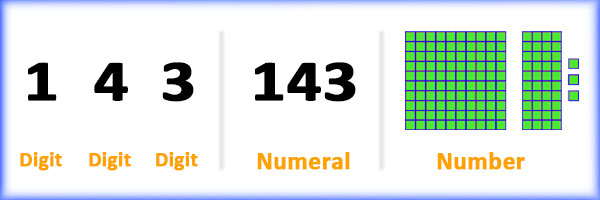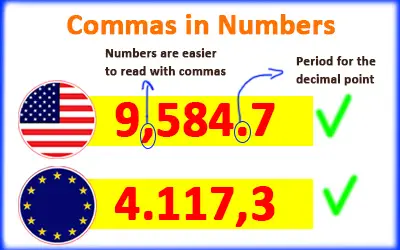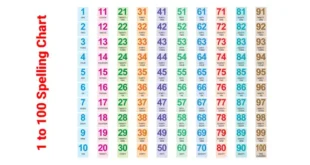Whether in French, English or any other language, you will need to know the rules for spelling and writing numbers in words. It is an essential element for any language: to tell the time, to ask for the price of something, to measure a distance or a quantity, etc.
In this article (mainly for beginners), I will show you how do you spell numbers in words and all the necessary number writing rules to avoid any mistakes.
👉👉 Don’t forget to take the Quiz at the end to test your understanding!
When should we consider writing numbers in words?
When it comes to spelling out numbers, you will find that most of the writing rules are not standard! And it’s quite painful! Do you have to write them in words or leave them as digits and numbers?
Writing numbers from zero to one hundred in non-technical handwriting is generally preferable. However, in scientific and technical writing, the most common style is to write numbers less than ten.
While we have exceptions to these rules, your major focus should be on consistently expressing numbers.
Also, you will need to consider the potential differences between various style guides (for instance, Chicago, APA, and MLA) to write numbers in correct form. Because these guides often describe different rules for using numbers in writing.
What is the difference between Digits, Numbers and Numerals?
Don’t confuse numbers with numerals and digits: it’s not the same thing!
In everyday language, it is very common to get confused. These three terms are indeed closely linked. Mathematically, however, these words do not have the same meaning.

What is a digit?
Digits are basic mathematical symbols with which a numerical value is associated. In the Arabic numbers symbolism used in the USA, there are only ten digits: 0, 1, 2, 3, 4, 5, 6, 7, 8 and 9.
- A digit is a single symbol used to write numbers.
What is a number?
A number represents a quantity, a value, a size. It can be composed of one or more digits.
- So the number is an idea, the numeral is how we write it.
For example :
- 875 is a number composed of the digits 8, 7 and 5.
- 7972410 is a number composed of 7 digits.
What is a numeral?
A numeral, which is one or more digits, is an ordered element in a series composed of several numbers.
For example, a room number, a telephone number, social security number…
How do you spell single-digit numbers ? (1 through 9)
Spell out the numbers between one and nine. Except if you run out of space, this is the most common way to write a one-digit number. Also write “zero”, as it can be easily confused with the letter “O”.
| 0 | Zero |
| 1 | One |
| 2 | Two |
| 3 | Three |
| 4 | Four |
| 5 | Five |
| 6 | Six |
| 7 | Seven |
| 8 | Eight |
| 9 | Nine |
Writing Double-Digit numbers from 10 to 90
| 10 | Ten |
| 11 | Eleven |
| 12 | Twelve |
| 13 | Thirteen |
| 14 | Fourteen |
| 15 | Fifteen |
| 16 | Sixteen |
| 17 | Seventeen |
| 18 | Eighteen |
| 19 | Nineteen |
| 20 | Twenty |
If you know how to write numbers from 1 to 20, you have already done half the job because, after that, writing out numbers in English is very regular. Aalso don’t forget that we use the comma to separate the thousands and the point to separate the decimals, however, in other languages it is upside down.
To write a number in words, it’s really very basic. We take the number of tens and separate it from the numbers of the units by a dash “-“.
- 20 in words: Twenty
- 30 in words: Thirty
- 50 in words: Fifty
- 80 in words: Eighty
- 90 in words: Ninety
Examples With dashes :
- 99 in words, it is enough to add the figure “ninety” to “nine”, which gives “ninety-nine
- 25 in words, it is enough to add the figure “twenty” to “five”, which gives “twenty-five
- 21 in words, it is enough to add the figure “twenty” to “one”, which gives “twenty-one
Hundreds and thousands in English
Writing out numbers in words with hundreds in English is also easy. We take the number of hundreds, add “and” and put the number or the numbers that follows
- 100 in words : A hundred or one hundred
- 200 in words : Two hundred
- 900 in words : Nine hundred
- 990 in words : Nine hundred ninety
As for the hundreds, it is very simple to write the numbers from 2000 to 900 000 in words.
Example:
- 4000 in words: Four thousand
- 8000 in words: Eight thousand
- 20000 in words: Twenty thousand
- 90000 in words: Ninety thousand
How do you write large numbers?
Maybe you are asking : How do you read a 7 digit number? Or even larger numbers!
It is quite easy, and this is very essential for business English in particular. If you say “billion” when you mean “million”, it can be a very big mistake! This is something you need to learn if you want to enhance your conversational and writing skills!
-
- 1000000 in words is a million in English.
- 1000000000 in words : Billion which is the equivalent of a thousand million that spelt billion in english (one thousand million)
In this video tutorial you will learn how to write large numbers in English step by step :
Writing Rule when beginning a sentence with a number
This is a rule that you can always use: Numbers at the beginning of a sentence are always spelled out, no matter how big they are.
Some times, it will look awkward to star a sentence with a figure. So in this case, you should reword it to avoid this.
What are the rules for hyphens?
You should always hyphenate numbers when writing a compound number between 21 and 99.
Any number that consists of two words is considered a compound number. For example, Sixty-seven, Seventy-seven, Twenty-one…
- Exception to this rule: 30, 40, 50, 60, 70, 80 and 90
- Numbers greater than 99 do not require a dash.
Rules for using commas and dots to separate numbers
In English writing, we split numbers greater than 999 with commas to make them easier to read.
We put a comma every third digit from the right, this is known as a “thousands-separator”. The decimal point is shown with a period or full stop.

Do not include spaces on either side of this comma.
- Example: Over 70,000 cars are manufactured every year
Separate thousands and millions in compound numbers using commas.
- Example: 1,681,860
Use no commas in decimals.
- Example: $7.52
If the date is given as month, day, year, use a comma before the year.
- Example: July 22, 2021
In some countries, large numbers are separated by dots and the comma is used for decimals.
- Example: 211,357.59
How do you write money amounts?
Here are some basic guidelines for writing U.S. currency and money amounts in general usage.
For amounts less than $1, use numerals with the word cent or cents.
- Example: Gasoline dropped 8 cents per gallon.
If the reference comes next to another dollar amount of $1 or more, in this case the cents must be formatted with $ and numbers.
- Example: Prices will soon be increased from $0.47 to $1.33 per piece.
When writing money amounts between 99¢ and $1 Million, use the dollar sign and numerals.
- Example: The subscription service is $783.88 per month.
If you are writing a check, you have to spell out in words the dollar value and you can write the cents numerically.
Replace a decimal point with ‘and’ when you write out amounts on a check.
- Example: forty-six thousand Seven dollars and 33 cents
Rules for writing times
Use numerals when you need to write the exact time and when using a.m. and p.m. However, the time is spelled out when it is followed by o’clock.
Examples:
- He arrived at home at seven o’clock in the morning.
- Wake me up at 9:00 a.m.
Common Mistakes In Writing English Numbers
Mistake 1 : Large Numbers
The first mistake we’re going to look at is related to large numbers.
Don’t worry It’s so easy, just keep in mind, if you have a number or a specific amount of money before : hundreds, thousands, millions, billions, trillions. Make sure you don’t add an ‘S’ at the end.
Example:
- He is making millions of dollars online.
- He is making hundreds of dollars online.
So, notice there’s no specific number here, it’s just hundreds of dollars in general. We don’t know how many hundreds, but we just know somewhere in the hundreds. Same with millions, we don’t know how many millions, we just know he stole millions of dollars not a specific amount.
But, if you have a specific number, there shouldn’t be an ‘S’, even though there’s more than one.
Example:
- I have 9 hundred followers.
- I have three thousand followers.
Mistake 2 : Single Numbers
The next mistake is very frequent. A lot of students and native English speakers get confused when they have to write numbers out.
If a number is a single number, or in other words, if you have a number where it’s just one word that you need to write (E.g. : Three, Twelve, Twenty…), in this case you will need to write it with letters.
Otherwise, if it’s not a single number (E.g. : Twenty-one, Two hundred eighty-four, one thousand six…), we wouldn’t write this out because it’s just too long. In this case we use the digits to write the numbers (E.g. : 21, 284, 1006,…)
Example:
- I have 7 cars. (wrong)
- I have seven cars. (correct)
The next thing you need to know is, when writing numbers at the beginning of a sentence you shouldn’t start with a numeral, the number should be written out in words.
Example:
- 7 birds are in the nest. (wrong)
- Seven birds are in the nest. (correct)
Useful Tip:
If you have a really long number to write, like in this sentence :
Three hundred eighty-six people attended the workshop.
It will be so long and awkward to write it. It’s better to change the sentence here.
So instead of saying Three hundred eighty-six people attended the workshop, you could say: The meeting was attended by 386 people
Mistake 3 : Adjectives
OK, so here is a final mistake that is seen often and that has to do with writing out numbers and also grammar in terms of pronunciation.
- The twenty-year-old boy.
- The boy is twenty years old.
If you’re using time, age or number of something as an adjective, use a hyphen and don’t add an “S”
Well, we have to think about whether or not we’re talking about an adjective. So in the first case, twenty-year-old boy is describing the noun boy, which is why we use hyphens here.
Mistake 4 : Writing money amounts
For figures followed by a dollar sign, don’t add the word “dollars”.
- Incorrect: I earned $2,344 dollars yesterday.
- Correct: I earned $2,344 yesterday.
Conclusion:
There are many different styles for writing numbers in word. This requires good grammar and focus on detail. Deciding whether to write numbers as words or as numerals is a matter of style. The key in all cases is to use a consistent style all along your writing.
Take the Quiz
Test your understanding of the Rules for Writing Numbers by answering this Quiz.
At the end of the quiz (10 questions), you will get the correct answers and your score.
Post your score in the comments below 👇👇 and let us know how you did.
Share your score and this quiz using the social media buttons at the end of the quiz.
No cheating! 😉
[ays_quiz id=’3′] Numbertowordsconverter.com
Numbertowordsconverter.com
